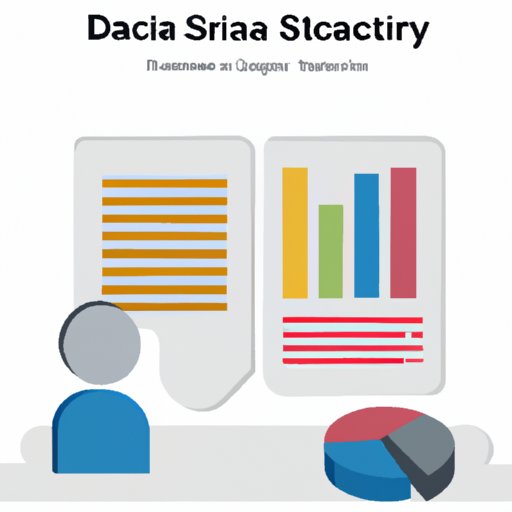Introduction
Data is a term that has become commonplace in today’s world. We hear about “big data” being used for everything from marketing campaigns to healthcare research. But what does the term “data” mean in the scientific realm? This article will explore the definition of data in science, looking at how it is collected and analyzed, as well as its role in decision-making.

Exploring the Definition of Data in Science
At its most basic level, data can be defined as information or facts collected for analysis. In the scientific realm, data is used to describe observations and measurements made during an experiment or study. According to a report by the National Academy of Sciences, “Data are the raw material of science.”
In scientific research, there are two main types of data: qualitative and quantitative. Qualitative data is non-numerical information, such as observations, opinions, and descriptions. Quantitative data is numerical information, such as measurements and counts. Both types of data can be used to analyze and draw conclusions about a particular phenomenon.
A Comprehensive Look at the Definition of Data in Science
Data collection is an essential part of scientific research. Data can be collected through experiments, surveys, interviews, and more. Once the data has been collected, it must then be analyzed. This analysis can involve sorting, counting, calculating averages, and more. The results of this analysis can then be used to draw conclusions and make decisions.
Data comes in many forms, from numbers and words to images and audio recordings. Regardless of the form, all data must be properly collected, stored, and organized in order to be useful for scientific research. For example, data collected from an experiment may need to be recorded in a spreadsheet so that it can be easily accessed and analyzed.
How is Data Used in Scientific Research?
Data is used in a variety of ways in scientific research. For example, data can be used to answer questions about a particular phenomenon, such as why a certain species of fish is declining in a specific area. Data can also be used to test hypotheses, predict outcomes, and identify patterns in nature. Data can even be used to develop new theories and models.
Data analysis can also provide insights into the effectiveness of different treatments or interventions. For instance, a researcher might use data analysis to determine whether a drug is effective in treating a particular disease. In addition, data analysis can help researchers identify areas where further research is needed.
The benefits of data analysis are numerous. By using data to draw conclusions and make decisions, scientists can save time and effort, as well as reduce the risk of error. Data analysis also allows scientists to make informed decisions about how to proceed with their research.

Understanding the Importance of Data in Science
Data plays an important role in the decision-making process for scientists. By analyzing data, scientists can identify trends and patterns that may not be visible to the naked eye. This information can then be used to inform decisions about which direction to take with a particular project or experiment.
However, it is important to remember that data is only one piece of the puzzle. Relying too heavily on data can lead to a false sense of security and can lead to wrong decisions. Scientists must take into account other factors, such as human judgment and experience, when making decisions.
Conclusion
Data is an essential part of scientific research. By understanding the definition of data in science, researchers can better collect, analyze, and utilize data in their work. Data can be used to answer questions, test hypotheses, and make decisions. However, it is important to remember to take other factors into consideration when making decisions based on data.
(Note: Is this article not meeting your expectations? Do you have knowledge or insights to share? Unlock new opportunities and expand your reach by joining our authors team. Click Registration to join us and share your expertise with our readers.)
